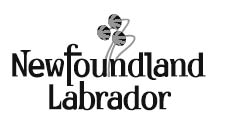- Home
- Information Bulletins

Labour Relations Board
June 30, 2015|
INFORMATION BULLETIN DISCLOSURE OF PERSONAL INFORMATION |
Openness and Privacy Policy
The Labour Relations Board (“the Board”) is an independent quasi-judicial tribunal that operates very much like a court and has responsibilities under the Labour Relations Act; Public Service Collective Bargaining Act; Fishing Industry Collective Bargaining Act; Teachers’ Collective Bargaining Act; Interns and Residents Collective Bargaining Act; Labour Standards Act; Occupational Health and Safety Act; Smoke-Free Environment Act, 2005 and House of Assembly Accountability, Integrity and Administration Act; and Public Interest Disclosure and Whistleblower Protection Act. This document outlines the Board’s policy on the openness of its processes and describes how it handles issues relating to privacy.
When filing any application with the Newfoundland and Labrador Labour Relations Board, all information included in the application is provided to the other party or parties as respondents or interested parties. Further, such information may be referred to in any order or reasons issued by the Board at the conclusion of the matter, on the Board’s website and in print and online reporting services that may publish the Board’s decision.
This Bulletin does not apply to the confidentiality of union membership information provided to the Board.
The open court principle is significant in our legal system. In accordance with that principle, the Board conducts its oral hearings in public, save for exceptional circumstances. Because of its mandate and the nature of its proceedings, the Board maintains an open justice policy to foster transparency in its processes, accountability and fairness in its proceedings.
The Board’s website, policy circulars, information bulletins and other publications advise parties and the community that its hearings are open to the public. Parties that engage the Board’s services should be aware that they are embarking on a process that presumes a public airing of the dispute between them, including the public availability of decisions. Parties and their witnesses are subject to public scrutiny when giving evidence before the Board, and they are more likely to be truthful if their identities are known. Board decisions identify parties and their witnesses by name and may set out information about them that is relevant and necessary to the determination of the dispute.
At the same time, the Board acknowledges that in some instances mentioning an individual’s personal information during a hearing or in a written decision may affect that person’s life. Privacy concerns arise most frequently when some identifying aspects of a person’s life become public. These include information about an individual’s home address, personal email address, personal phone number, date of birth, financial details, SIN, driver’s licence number, or credit card or passport details. The Board endeavours to include such information only to the extent that is relevant and necessary for the determination of the dispute.
With advances in technology and the possibility of posting material electronically — including Board decisions — the Board recognizes that in some instances it may be appropriate to limit the concept of openness as it relates to the circumstances of individuals who are parties or witnesses in proceedings before it.
In exceptional circumstances, the Board departs from its open justice principles, and in doing so, the Board may grant requests to maintain the confidentiality of specific evidence and tailor its decisions to accommodate the protection of an individual’s privacy (including holding a hearing in private, sealing exhibits containing sensitive medical or personal information or protecting the identities of witnesses or third parties). An individual requesting to have personal information protected from a decision shall make their application to the Board and such application shall be made when they know or ought to know that their personal information could be included in a decision. The Board may grant such requests when they accord with applicable recognized legal principles.
The Board’s policy is consistent with the statement of the Heads of Federal Administrative Tribunals Forum (endorsed by the Council of Canadian Administrative Tribunals) and the principles found in the Protocol for the Use of Personal Information in Judgments approved by the Canadian Judicial Council.
Access to files
The Board provides parties with access to their files in accordance with the rules of natural justice.
The Board’s files are maintained only in paper format. They are available to the parties for consultation at the Board’s premises with appropriate notice. However, information protected by solicitor-client privilege is not available for consultation.
Board files contain correspondence between the parties, and are available, after the file is closed, to the public for consultation at the Board’s premises with appropriate notice. However, information such as an individual’s home address, personal email address, personal phone number, date of birth, financial details, SIN, driver’s licence number, or credit card or passport details is not available for consultation. Further, information protected by solicitor-client privilege is not available for consultation.
Access to decisions
The Board provides public access to its decisions in accordance with the open court principle.
Board decisions are available electronically on its website and it shares its decisions with CanLII – Canadian Legal Information Institute. In an effort to establish a balance between public access to its decisions and privacy concerns, the Board has taken measures to prevent Internet searches of full-text versions of decisions posted on its website. This was accomplished by using the “web robot exclusion protocol,” which is recognized by Internet search engines (e.g., Google and Yahoo). As a result, an Internet search of a person’s name will not yield any information from the full-text versions of decisions posted on the Board’s website.